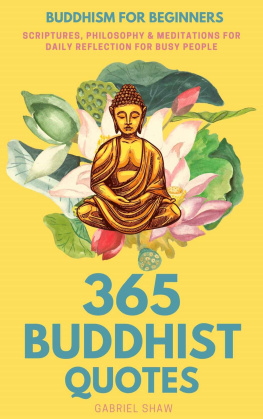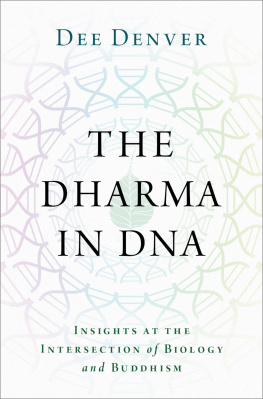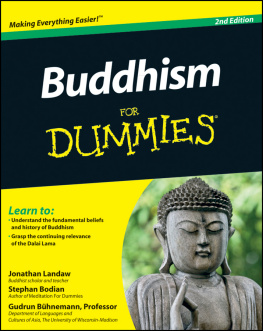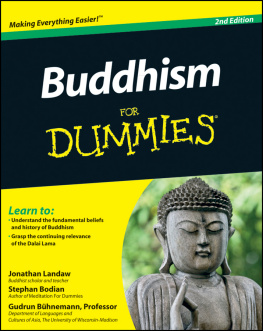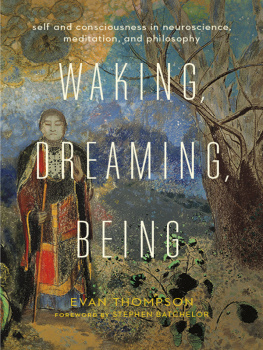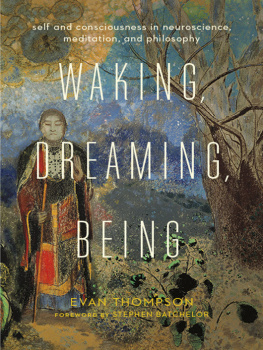why i am not a buddhist
evan thompson
why i am not a buddhist

Copyright 2020 by Evan Thompson. All rights reserved. This book may not be reproduced, in whole or in part, including illustrations, in any form (beyond that copying permitted by Sections 107 and 108 of the U.S. Copyright Law and except by reviewers for the public press), without written permission from the publishers.
Yale University Press books may be purchased in quantity for educational, business, or promotional use. For information, please e-mail (U.K. office).
Set in Times Roman & Adobe Garamond type by Integrated Publishing Solutions, Grand Rapids, Michigan.
Printed in the United States of America.
Library of Congress Control Number: 2019940800
ISBN 978-0-300-22655-3 (hardcover : alk. paper)
A catalogue record for this book is available from the British Library.
This paper meets the requirements of ANSI/NISO Z39.48-1992 (Permanence of Paper).
10 9 8 7 6 5 4 3 2 1
For Becket
contents
introduction
Buddhism is one of humanitys great religious and intellectual traditions. It is, and deserves to be, a participant in the secular and liberal democratic societies of our modern world. It is, and deserves to be, a contributor to a cosmopolitan community, one in which people participate in relationships of mutual respect and cooperation, despite their differing beliefs. Throughout its history, especially in South and East Asia, Buddhism has played this role of contributing to cosmopolitan societies. It has enriched the religious, intellectual, and artistic worlds of its pluralistic host cultures. Now Buddhism also enriches the modern world. In North America, Asian immigrants and European and American converts have created new kinds of Buddhist communities, rituals, and artworks. Buddhisms influence on popular culture is widespread. Buddhism continues to be one of our most vibrant traditions.
Nevertheless, the dominant strand of modern Buddhism, known as Buddhist modernism, is full of confused ideas. They coalesce around what I call Buddhist exceptionalism. Buddhist exceptionalism is the belief that Buddhism is superior to other religions in being inherently rational and empirical, or that Buddhism isnt really a religion but rather is a kind of mind science, therapy, philosophy, or way of life based on meditation. These beliefs, as well as the assumptions about religion and science on which they rest, are mistaken. They need to be discarded if Buddhism is to take its rightful place as a valuable contributor to a modern cosmopolitan community. Cosmopolitanism, the idea that all human beings belong to one community that can and should encompass different ways of life, provides a better framework for appreciating Buddhism, and for understanding religion and science, than Buddhist modernism. That is the argument of this book.
I am not a Buddhist. Im a philosopher who believes in cosmopolitanism and who also values Buddhism. I like to think of myself as a good friend to Buddhism. My reasons for not being a Buddhist are many and go deep into Buddhisms rich intellectual tradition and my own evolution as a philosopher. Although this book isnt a memoir, there is a personal story behind it. Telling that story is the best way to introduce this book.
When I was eleven years old I came back from a family trip to Scotland to find that the commune I lived in had been taken over by a new enthusiasm for Zen Buddhism. It was 1974 and my family lived at the Lindisfarne Association, an alternative educational community in Southampton, New York, founded by my parents, Gail Thompson and William Irwin Thompson. The Lindisfarne Fellows included scientists, scholars, artists, environmentalists, activists, and contemplative teachers from many religious traditions. We had ties to the San Francisco Zen Center, and before we left my father had asked its abbot, Richard Baker Roshi (who was a Lindisfarne Fellow), to send a Zen teacher to live with us. The teacher, Reb Anderson, had arrived and taken up residence while wed been gone.
My father was pleased: Things are so well run, and theres a lot more discipline and mindfulness. My sister, Hilary, and I were not so impressed. The other kids werent either. We were used to running all over our ten-acre property doing whatever we liked. Now we had to take off our shoes and keep quiet whenever we entered the main lodge. There were more dinners with mushy brown rice and overcooked steamed vegetables that not even huge gobs of ketchup could fix. A weird formality seemed to have taken over many people in the community. The occasional silent meals were the worst. To get anyone to pass you anything you had to make hand gestures and bow afterward. Of course, we made faces at each other trying to get someone to break down and laugh. Then wed run around imitating the pious expressions and silly gestures of the adults. I was the oldest kid, and sometimes I would go to the daily group meditation at five-thirty in the afternoon before we ate dinner at six oclock. My father thought the presence of Zen made the meditation rooms atmosphere thick and weighty, but the Zen demeanor seemed forced to me.
I had nothing against Buddhism. On the contrary, Id read about the life of the Buddha in a book my father gave me when I was eight years old. He knew that I was interested in the Buddhas ideas and that I liked the image of the Buddha sitting in meditation under a tree, so for my twelfth birthday he gave me a small wooden box that pulled apart from both sides to reveal a statue of the Buddha he had fixed to the inside. The present came with a card on which he had written, Wonder of wonders, in all things there is the Buddha nature. The box is long gone, but I still treasure the little statue.
A couple of years later, I met the Buddhist translator Robert Thurman, who came to a Lindisfarne Fellows Conference to translate for Nechung Rinpoche (Thupten Konchok, 19171982), a Tibetan Buddhist lama. His sharp eyes and bright smile, and the melodious sound of his Tibetan, were enthralling, while Thurmans occasional embellishments had the audience in stitches. Afterwards, Nechung Rinpoche and Gomang Khen Rinpoche stayed with us for six weeks at our center in Manhattan. Their friendly ways were striking compared with the subservient formality of the American disciples who visited them.
I was home schooled at Lindisfarne. I liked reading books about philosophy and mysticism, and I liked meditating. I studied Classical Greek and read the Greek New Testament. When I was fifteen, I wanted to get out of the city and go somewhere quiet and contemplative, so I took a 4 a.m. bus from Port Authority Station to Spencer, Massachusetts, to spend a few days at St. Josephs Abbey, a Trappist monastery. Father Basil Pennington, who lived at the abbey and had visited Lindisfarne, took me under his wing. Pennington was a proponent of Centering Prayer, a Christian method of meditation. He brought me to a half-day Zen sesshin (meditation retreat), where Catholic monks from the abbey and Zen disciples practiced zazen (Zen meditation) together. The Christian monks were very interested in the practice, but the Japanese Zen
When it came time for me to think about going away to college, my father suggested I talk to Thurman, who was a professor in the Religion Department at Amherst College. I told Thurman I wanted to study Daoism and Classical Chinese. After quizzing me to see whether I knew anything about Daoism, he said, Daoism is great, but if you really want to study Asian philosophy, you should study Buddhism. Youll find more for your philosophical interests there.
I applied to Amherst, was admitted, and arrived there in 1979, at age sixteen. Thurman was on sabbatical that year, so I saw him only briefly when the Dalai Lama spoke at Amherst that fall on his first trip to the United States. Since I was interested mainly in Chinese intellectual history and philosophy, I declared my major in Asian Studies and started studying Chinese.
Next page


